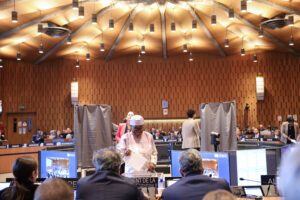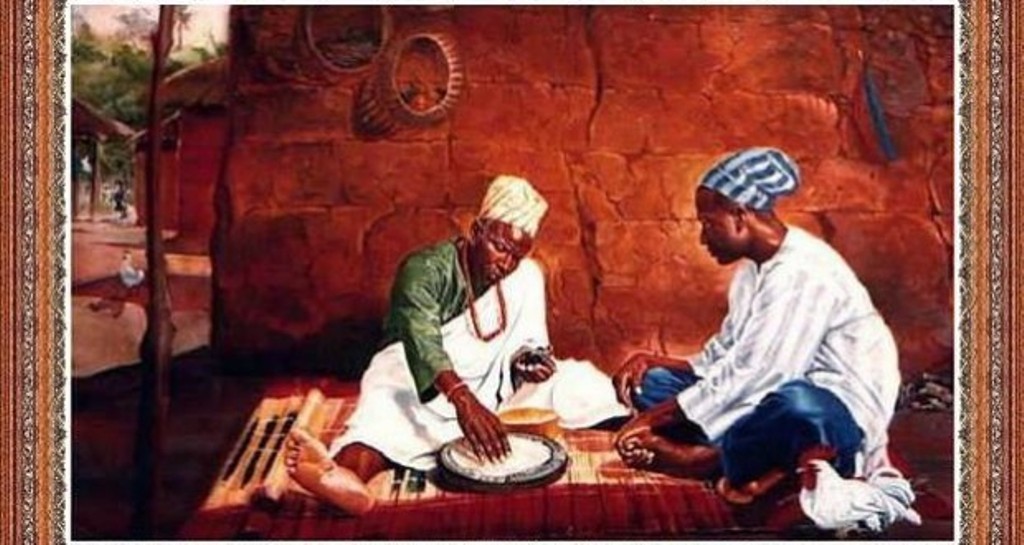
Cultural heritage is defined by UNESCO as being “the legacy of physical artefacts and intangible attributes of a group or society that are inherited from past generations, maintained in the present and bestowed for the benefit of future generations”. This definition is further broken down into “tangible” and “intangible” cultural heritage. Tangible heritage including physical artefacts belonging to a culture such as buildings, historic places, monuments, and artefacts, whereas intangible heritage comprises of non-physical intellectual property including folklore, customs, beliefs, traditions, knowledge, and language.
Nigeria is home to 4 inscribed elements on the representative list of the intangible cultural heritage of humanity. These elements are:
- Oral Heritage of Gelede
- Ifa Divination System
- Ijele Masquerade
- Argungu International Fishing and Culture Festival
Oral Heritage of Gelede
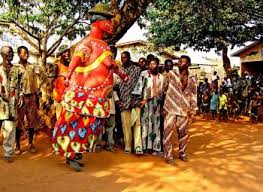
The oral heritage of Gelede is a Yoruba masquerade that involves various aspects of art, music and dance. Usually taking place every year after the harvests or a major event, it is primarily known for the elaborate masks and costumes that are created as part of the tradition and the unique dances that are performed by participants.
The festival centres around paying tribute to Iyà Nlà, deemed to be the primordial mother as well as a tribute to women in Yoruba culture. Many performances take place during the festival, with these performances being given by men wearing masks that feature sculpted images of scenes including animals, people and drums. The men group in pairs and masquerade as women to amuse and please the mothers who are considered very powerful and may use their powers however they please.
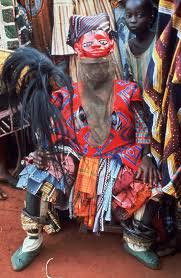
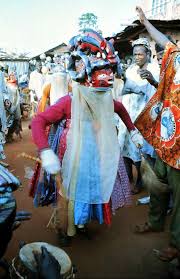
In recent times the Gelede tradition has waned due to the lack of traditional specialists in some communities, however measures have been taken to protect the tradition. In need of safeguarding, it was added to the representative list of the intangible cultural heritage of humanity in 2008 at the Third Session of the Intergovernmental Committee for the Safeguarding of the Intangible Cultural Heritage.
To learn more about Gelede visit the ICH UNESCO website.
Ifa Divination System
Ifa is a complex divination system central to Yoruba culture. It takes its name from the Yoruba god of divination ‘Ifa’, or ‘Ọrunmila’ and it is a ritual performance in which the priest, clients, and the social and cosmological order of the Yoruba people interact to provide results to a client’s quest and purpose for consultation. Normally these clients will query about illness, marriage and other personal matters.
The basis for this depth of trust is established in Yoruba belief, cosmology and moral order, which entrusted Ifa with the knowledge of all that exists in the universe. An omniscient deity, Ifa is personified as the all-knowing historian, storyteller, and intermediary between the gods and the people.
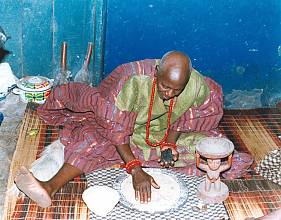
The divination process begins when a client consults a diviner, and the diviner casts the opele, a divining chain on the divining mat or uses a set of sixteen palm nuts to find an answer. The result of divination is referred to as the ‘Signature’ or ‘Signs of Ifa’, which may be one of 256 possible signs. With their finger, the diviner traces the Signs of Ifa, now discernible in the iyerosun, a yellow divining powder which is sprinkled over the surface of the opon Ifa, a divining tray. Afterwards the diviner states the results, then he recites the message of the Signature of the Ifa deity who appears in the procedure. The diviner explains the message to the client, suggesting which suitable sacrifices should be made. It is indeed a long process for an apprentice to earn the title of priest-diviner, taking up to 30 years and sometimes more with the apprentices having to commit to memory an extensive amount of difficult verses needed to carry out divination.
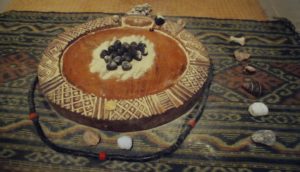
In recent times the Ifa Divination System has lost popularity amongst Yoruba people due to the spread of Christianity under British colonial rule and the view of similar divination systems as dated and improper. Despite this, a large amount of timeless Ifa poetry that had been preserved in the memory of oral historians and priests has been collected and translated into English and French. In 2008 the Ifa Divination System was inscribed into the Representative List of the Intangible Cultural Heritage of Humanity as a measure of safeguarding the tradition.
To learn more about the Ifa Divination System visit the ICH UNESCO website.
Ijele masquerade
Ijele masquerade is an Igbo tradition hailing from Anambra State which normally takes place to mark various special occasions such as burials and celebrations. It is recognised as being the biggest masquerade in Sub-Saharan Africa, with the gigantic structure of the mask also reportedly making it the largest mask system ever to enter the history of the world masking tradition.
The sheer size of the mask makes the Ijele masquerade a sight to behold. Traditionally, the mask is constructed by a group of one hundred men who also spend six months organising the festivities. By its completion the mask may contain various objects relating to Igbo life and culture such as multicoloured textiles as well as multiple statues, a handcrafted snake and mermaid objects. Despite its size, the mask is only worn by one man at a time who as part of the performance will dance alongside a band and six ‘Ijele police’ whose role is ensure that nobody encroaches on Ijele. As well as this there is a mirror which is believed to have the power to draw in and punish evildoers in the area.
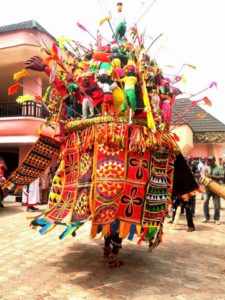
The bearers of the mask are often shrouded in secrecy. They are usually selected via a ballot, following which they put onto a specific diet which is believed to strengthen them enough to wear the mask for an extended amount of time and are then isolated for three months before the masquerade.
Despite the large fanfare the masquerade attracts it has recently become a festivity in need of urgent safeguarding. In order to successfully continue the tradition, it was inscribed into the Representative List of the Intangible Cultural Heritage of Humanity in 2009.
To learn more about Ijele masquerade visit the ICH UNESCO website.
Argungu international fishing and cultural festival

The Argungu Fishing Festival is a yearly festival that usually takes place at the end of February in Kebbi State over the course of four days to observe the end of the longstanding hostility between the Sokoto Caliphate and the Kebbi Kingdom. The festival also marks the end of the growing season and the harvest. Originally it was celebrated as a religious festival but was reformed in the early 1800s by Sokoto’s ruler Shehu Usman Dan Fodio when he captured the Kebbi Empire during a jihad. Soon after he established a village and named it Argungu.
On the final day of the festival a fishing competition takes place in the River Mata Fada. Participants can win a cash prize of $7,500 U.S. Dollars but are only permitted to use traditional fishing tools or their hands. The winner of the competition is the person who captures the largest fish in the space of an hour.
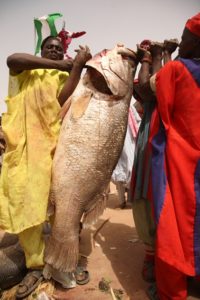
Other aspects of the festival include canoe racing, wild duck hunting, barehanded fishing, diving competitions and swimming. Subsequently a lot of drinking, singing and dancing takes place with festival goers celebrating into the night.
In order to make it a success, throughout the year a 1.6 kilometre stretch of the Argungu River is under protection so that there will be more than enough fish for the competition. After not being observed for almost ten years, Kebbi state officials decided to resuscitate the festival in 2018 and also decided to add to it a polo tournament.
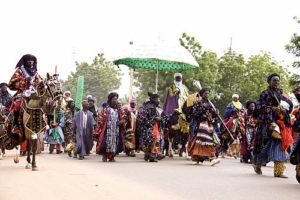
The unique nature of this festival has made it a success amongst the peoples that attend it, however concern over low water levels has plunged the festival into doubt in recent years with the festival organisers, even temporarily banning fishing in 2006. In order to safeguard the festival it was inscribed into the Representative List of the Intangible Cultural Heritage of Humanity in 2016.
To learn more about the Argungu international fishing and cultural festival visit the ICH UNESCO website.



